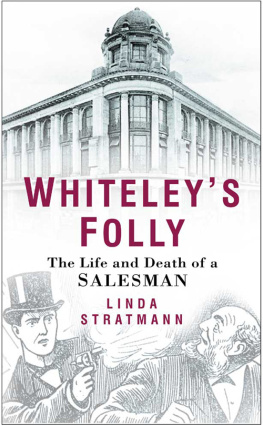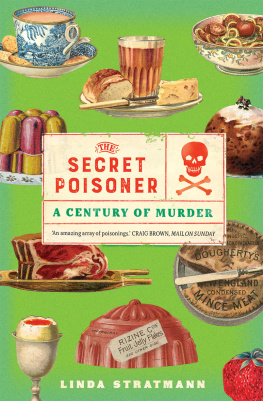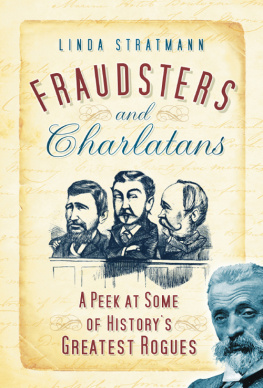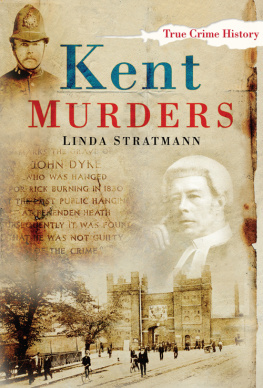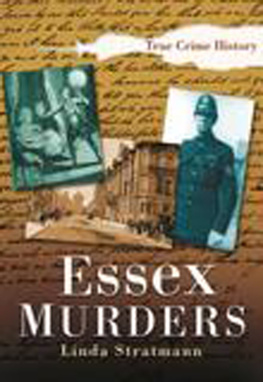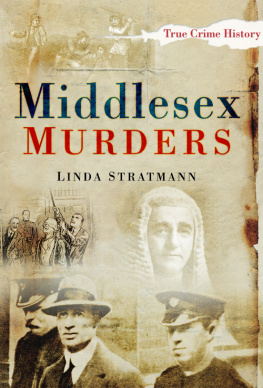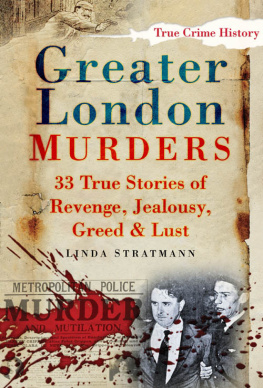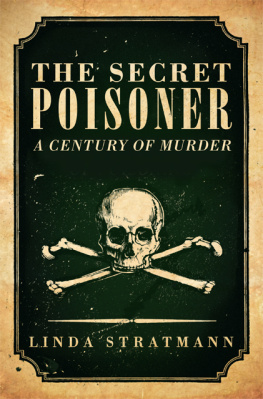Linda Stratmann - Whiteleys Folly
Here you can read online Linda Stratmann - Whiteleys Folly full text of the book (entire story) in english for free. Download pdf and epub, get meaning, cover and reviews about this ebook. year: 2004, publisher: The History Press, genre: Non-fiction. Description of the work, (preface) as well as reviews are available. Best literature library LitArk.com created for fans of good reading and offers a wide selection of genres:
Romance novel
Science fiction
Adventure
Detective
Science
History
Home and family
Prose
Art
Politics
Computer
Non-fiction
Religion
Business
Children
Humor
Choose a favorite category and find really read worthwhile books. Enjoy immersion in the world of imagination, feel the emotions of the characters or learn something new for yourself, make an fascinating discovery.
- Book:Whiteleys Folly
- Author:
- Publisher:The History Press
- Genre:
- Year:2004
- Rating:5 / 5
- Favourites:Add to favourites
- Your mark:
- 100
- 1
- 2
- 3
- 4
- 5
Whiteleys Folly: summary, description and annotation
We offer to read an annotation, description, summary or preface (depends on what the author of the book "Whiteleys Folly" wrote himself). If you haven't found the necessary information about the book — write in the comments, we will try to find it.
Whiteleys Folly — read online for free the complete book (whole text) full work
Below is the text of the book, divided by pages. System saving the place of the last page read, allows you to conveniently read the book "Whiteleys Folly" online for free, without having to search again every time where you left off. Put a bookmark, and you can go to the page where you finished reading at any time.
Font size:
Interval:
Bookmark:

To
Jenni
My grateful thanks to all the people and organisations who have helped me with this book. The British Library; Colindale Newspaper Library; The Family Record Centre, London; Alison Kenney of the Westminster Archives Centre; Helen Swinnerton and Tina Staples of HSBC Archives; West Yorkshire Archives; Chris Welch of the Wakefield Family History Society; Colonel AC Ward and Wendy Bazill of the Whiteley Homes Trust; Sally Kemp of Whiteleys Bayswater. Especial thanks are due to Jenni, who gave me the idea, and my husband Gary, who understands all about the downside of being married to a writer, and is still unfailingly supportive.
Work to live. Everything comes to him who works.
Make your business your hobby.
Think for yourself and rely upon yourself.
Be honest in all your dealings.
Watch the waste.
Remember civility costs nothing.
Avoid extravagance and needless expenditure.
Pay as you go. If you cannot pay, do not go.
Do not despise little things.
Keep cool and never lose your temper.
Be orderly and punctual.
Never, never, never say die.
If I had my life to live over William Whiteley,
Weekly Dispatch, 4 February 1906, p. 1
T he anonymous stranger who called at the home of William Whiteley at 11.30 on the morning of Thursday 24 January 1907, requesting an interview, cannot have known much about the daily routine of the great man. The self-styled Universal Provider, though in his seventy-sixth year, had, punctually as ever, departed his home at nearby 31 Porchester Terrace so as to arrive at the world-famous emporium which bore his name shortly after 10 a.m. Apart from Sundays and his annual holiday, he had attended his business virtually every day for almost forty-four years. A short, square, stocky figure, with flowing white side whiskers, dark grey eyes glancing keenly about him, it was his habit to start the day by walking about the store inspecting each department, and though his smile could be genial and his manner friendly, no one was in any doubt about the storm which would break if he spotted something not arranged to his liking. Eventually, and much to everyones relief, he headed towards no. 43 Westbourne Grove.
Beside the umbrella counter at no. 43 was a door with a brass plate inscribed with Mr Whiteleys name. Behind it was not an office in the strict sense, but a small windowless space, modestly furnished with a table, chairs and roll-top desk, which was the Universal Providers own private room. This was not a sign of personal humility, nor did it suggest that the old man was being sidelined by the younger, more active directors who had managed the business since it became a limited company in 1899. William Whiteley would never have sanctioned an office for himself which took up any more space than strictly required. Every square inch not used for the selling of goods was, in his eyes, wasted.
There, he would spend his days perhaps dashing off terse letters to his investment brokers, dealing with litigation, seeing visitors, writing articles, and planning, always planning for the future. Although in the autumn of his career, his iconic status as a figurehead of national and international trade meant that his opinions were still frequently sought, and every word of business advice that fell from his lips was received as a treasure. He had only recently been interviewed for a three-page memoir in the London Magazine of Commerce , due to go to press in a few days.
No. 43 was only one of an imposing row of shops, themselves part of an accumulation of properties covering 14 acres, with the Whiteley name everywhere in tall gilded lettering, and a flag waving high above. The retail premises, warehouses, staff dormitories, delivery depots, stables, factories, and laundries employed some 6,000 people. For a man of humble beginnings who had arrived in London with less than 10 to his name, it was a staggering achievement. Recently, his declining vigour had meant that many of the duties he had always attended to personally were now allotted to others, but William Whiteley had not loosened the reins of control. He was still the chairman of the company, and the only director on the board exempt from the regulations which entitled the others to remove one of their number.
Over the years he had been both admired and reviled, acquiring the kind of personal celebrity rarely achieved by tradesmen, but incurring the wrath and jealousy of those unable to keep pace with his all-devouring ambition. By 1907, however, the days of conflict were long gone, and he was now the popular Grand Old Man of Bayswater, symbol of its prosperity. The previous Christmas he had been unwell, and his doctor had told him to take life more slowly, warning that heart disease would probably claim him in another two years. Whiteley had taken the news stoically and determined to spend the time he had left where he felt happiest at work.
That Thursday, at about 12.30 p.m., the same young man who had called at his house earlier, entered Whiteleys stores asking to see the proprietor. It was not unusual for the Universal Provider to see people without an appointment, and the visitor was told he must first apply to the chief cashier, Mr Goodman. In Goodmans office he repeated his request, saying, If you will tell Mr Whiteley I come from Sir George Lewis, he will admit me.
Lewis was a well-known solicitor, the head of an eminent firm which had once acted for Mr Whiteley in a matter of some delicacy. Goodman cast a searching eye over the stranger. He saw before him a man in his late twenties, tall, well-dressed and gentlemanly, having all the appearance of a managing clerk. There seemed to be nothing remarkable about him, although had Goodman approached any nearer he might have noticed that the visitor had recently fortified himself with several glasses of brandy. The name of George Lewis was enough to gain an interview. Whiteley himself ushered the young man into his room and closed the door.
The business of the store bustled on as usual. It was remnant day, when crowds of ladies would descend upon Whiteleys, and for a time become surprisingly unladylike in their efforts to beat each other to the bargains. The noise was more than sufficient to obscure any sounds of the private interview. Mr Gross, Whiteleys correspondence clerk, looked in briefly, and found the two men still in conversation, his employer testily impatient to bring the meeting to an end.
At about 1 p.m. the door of Whiteleys room opened abruptly and he emerged, looking pale and agitated. His arms were by his sides and his fists were clenched. He strode up to Glyn James, an assistant in the nearby fur department, usually referred to as Jules and said curtly, Jules, fetch me a policeman! The assistant at once did as he was told. Whiteley waited outside his room for the police to arrive. About two minutes passed and he was about to go for lunch when the unknown visitor, who clearly did not, like Whiteley, think their meeting was over, pursued him into the store.
Are you going to give in? he demanded.
No, said Whiteley, a man for whom not giving in was, as his visitor should have known, a way of life. He made brusque gestures of dismissal.
Then you are a dead man, said the stranger. Before any of the horrified staff could make a move to intervene, he took from his pocket a black six-chambered Colt revolver, fired two shots point blank into the head of William Whiteley, then placed the muzzle to his own temple and fired again.
Next pageFont size:
Interval:
Bookmark:
Similar books «Whiteleys Folly»
Look at similar books to Whiteleys Folly. We have selected literature similar in name and meaning in the hope of providing readers with more options to find new, interesting, not yet read works.
Discussion, reviews of the book Whiteleys Folly and just readers' own opinions. Leave your comments, write what you think about the work, its meaning or the main characters. Specify what exactly you liked and what you didn't like, and why you think so.

